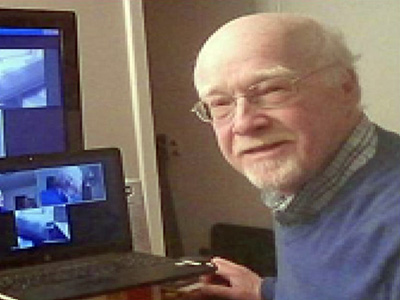The melodic stretch of professor Jerry Skelley’s career
by Alexandria Zine
The novel musical transpirations within Professor Jerry Skelley’s position at 4Cs are going to graciously shift toward personal matters, now that he plans to retire from the Music Department after the spring semester of 2021. After collecting fifty years as a 4Cs music instructor, Skelley is going to miss the lissome tone that the art of musical instruction has contributed to his life throughout the years. His life has been a convergence of various notes, just like the lives of many, and he feels that it is time to render slightly softer notes at this point in his career.

Preceding his indelible stay at 4Cs, Skelley officiated esoteric music lessons, recalibrated pianos, and assumed a position as a soloist at innumerable, local venues. Upon the development of a fondness for 4Cs and its portentous vacancy, Skelley accepted a part time foothold in 1995 before its transition to a more permanent position in 2004.
“I turned 70 last August,” said Skelley, “and I’ve been teaching since I was 20. So, this year will make it a nice even 50-year career. It is a good time to slow down. My children and grandchildren are all in the Washington DC area, so my wife and I would like to spend more time down there.” Despite the cleft of poignant, subjective matters that propelled Skelley toward retirement, he is going to miss the consistent communication with his [former] colleagues and students. “I have consistently enjoyed my interactions with colleagues in theater, dance, and debate. I am frequently in awe of their diverse range of talents.” He said he is also going to retrieve the capriciousness that he once had regarding the use of technology. Given the eventual ebb of his instruction, he is going to “…miss the ongoing need to stay current with technology.”
The avenue of artistic instruction has left Skelley with many remarkable experiences and convictions toward the bountiful opportunity that music can provide for young minds. “I love teaching because I love watching the “light bulb turn on” moments when the students suddenly grasp the basic concepts of music,” said Skelley. “But I’ve also had several excellent teachers in my earlier days who taught me how to practice acquiring new skills. Inevitably I remember my own mentors as they pass along the knowledge to my current students.”
While cemented in the duration of the Jazz Combo class, one of his favorite courses, Skelley has had the chance to witness the vehemence of music among the expansion of youthful hearts and realities. “It’s almost magical to see students get inspiration and then take the lead in explaining their ideas to the rest of the class,” said Skelley. “The single most magical moment for me was during a public performance, when the arrangement got “screwed up” and we had no particular way to finish a song. One student, realizing the predicament, simply looked at the other students and yelled “One, two, three, go!” and we all jumped back in at a “likely spot” on the paper… and it worked beautifully.”
Despite the poignancy, “the first few years of teaching were challenging, finding out my personal style and devising ways to present material. It was never intractable, but sometimes the number of hours was grueling.” With the introduction of his retirement, Skelley has even greater enthusiasm toward life’s transpirations, given the abundance of time that is not ensnared by many worthwhile responsibilities. Since the emergence of COVID-19, Skelley has realized the immense implications of music during lugubrious and lanky times, especially its fluidity to match the collective reality of traversing the protocols. “The pandemic,” said Skelley, “or rather the pivot to remote teaching has been an eye-opening experience. I’m proud of my ability to adjust, but the adjustments are on-going.” The pandemic has truly coaxed the universal appreciation/gratitude for the arts, particularly music and the flexible tendency of musical compositions, much like the adherence to the protocols.
Another difficult aspect of teaching one of the chambers of the arts is enabling the fluidity of a student’s work. “Some of my students have been learning to compose their own music,” said Skelley. “It would be all too easy to imprint my artistic tastes onto these students, so the challenge of this kind of teaching is finding ways to encourage the students to “find their own voice.” Just as a musician reaches the recapitulation of their piece, Skelley has found adequate aplomb between his departure from the 4Cs community and his familial matters. There has been a positive permutation in the melody of his lifetime, and Skelley needs no reassurance in his knowledge that 4C’s student body can adapt the melodies of their minds for obdurate interferences, such as COVID-19.
Categories: Professors, People